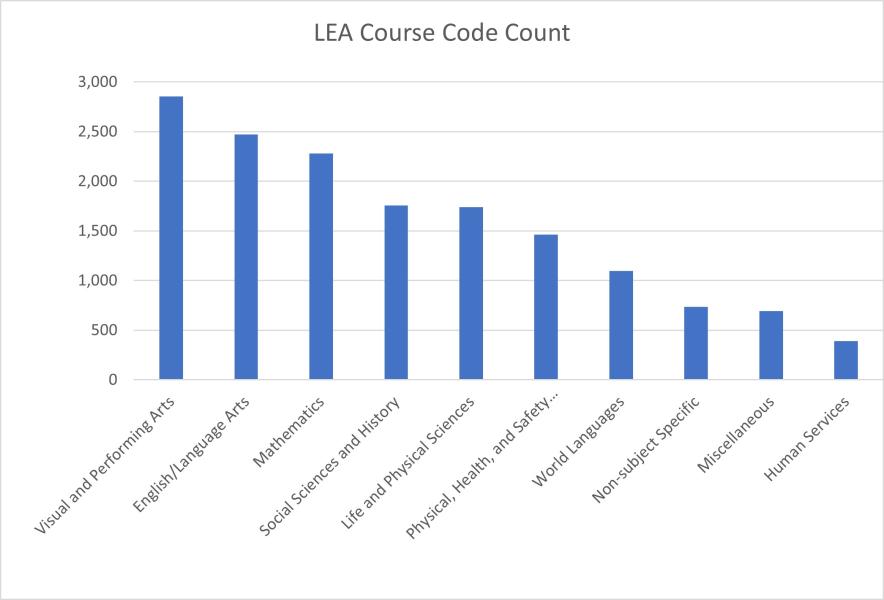The Office of the State Superintendent of Education (OSSE) is always looking to improve the quality of data that we collect and share with the community, particularly when it can connect to other data and enhance our ability to help families make decisions. For example, we know that deciding how to rank schools in a school lottery application has broad impact and we want to ensure that each family has the information needed to make choices based on their different priorities. Because of this, we have emphasized the importance of collecting and sharing quality data by making it a priority throughout our Recovery to Restoration 2023-25 Strategic Plan.
This school year marks the beginning of District-wide course data collection. This will ultimately lead to the streamlining of existing data collections and allow OSSE to gain new insights into the ways that instruction is delivered across the District. For example, OSSE’s Division of Teaching and Learning will have access to new information that allows them to be more strategic and responsive when planning professional development.
Learning From Other States and Piloting the Process
We began this process in 2021, using funding from the Elementary and Secondary School Emergency Relief Fund (ESSER) to conduct landscape analysis and study the ways that other states already collect this type of data. As a result, a decision was made to use the School Courses for the Exchange of Data (SCED) as the basis for creating OSSE’s own Course Catalog. SCED is a set of course codes, with matching course names and titles, that is developed and maintained by a National Center for Education and Statistic (NCES) working group, which is comprised of state and local education agency (LEA) representatives. Though each state can customize the catalog by adding unique course codes, this means that DC’s system is very close to what is used in other states (including Maryland and Virginia). Among other things, this will make it easier to understand the academic records of students who may transfer to DC from other states that also use SCED.
In the 2022-23 school year, OSSE piloted the data collection process with 12 volunteer LEAs; this process gave OSSE a chance to test out training materials and tweak the overall design of the internal data collection process before rolling it out to all LEAs. Building upon the landscape analysis and feedback from pilot LEAs, OSSE finalized the collection templates and updated the OSSE State Course Catalog, including adding course codes unique to the District.
The First Course Data Collection
Between June and October 2023, the OSSE Course Data Collection Team delivered two comprehensive trainings, seven-course coding workshops, three sessions of office hours and 16 individual support sessions to LEAs. As a result, OSSE collected data about 16,487 courses when each LEA in the District submitted a course catalog to OSSE. Though the course catalogs will continue to be collected annually, OSSE does not expect LEAs to need to make many changes from year to year. This data collection includes information about each credit-bearing course taught to all students enrolled in the LEA, pre-K 3 through Adult. Intervention services, before and after school programs, and other ways that schools serve students outside of time spent in academic courses is not within the scope of this collection.
LEAs assigned each course a five-digit course code from the OSSE State Course Catalog that is the best match between the OSSE and LEA course descriptions. For example, OSSE Course Code 04105 is meant for Social Sciences and History courses that cover state-specific studies. It was used for a course called “Go Go, Human Rights and Social Action.” LEAs also provided additional information about each course, such as if the course is specifically designed for English learners, if students are taking the course while dually enrolled at an institute of higher education, or which curriculums are used for literacy courses.
The chart below illustrates the subject-area distribution of the ten most commonly submitted courses:

Based on all LEA courses submitted, 17 LEAs offer a total of 373 Advanced Placement (AP) courses, five LEAs offer a total of 161 International Baccalaureate (IB) courses and students are learning 11 different foreign languages across the District, including Japanese and Arabic.
Future Years
OSSE is now in the planning stages of expanding the course data collection to include more information about who teaches and takes each course that is provided from an LEA’s course catalog. This will likely be done through a daily feed system, similar to how attendance information is currently collected from LEAs, beginning at the start of the 2024-25 school year. For example, OSSE will soon know how many sections of a certain AP course are being offered each semester—District-wide—and how many students are enrolled in these classes. We will also have more information about which courses are being taught in languages other than English, and which students with special education needs are being served by which para professionals in a given course. With this additional level of data, we will be able to conduct increased analysis to determine which students have access to which courses, what interventions are most successful, and better understand our greatest instructional strengths, gaps and needs.
Learn More
For more information about the 2023-24 course data collection, please see OSSE’s website, where there is a copy of the 2023-24 School Year LEA Course Data Collection Policy Guide and the OSSE State Course Catalog.


